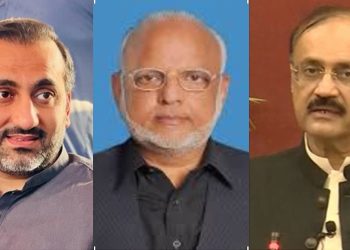ISLAMABAD: The Supreme Court of Pakistan (SC) on Tuesday allowed the Election Commission of Pakistan (ECP) to continue the contempt proceedings against PTI Chairman Imran Khan and other party leaders, Fawad Chaudhry and Asad Umar.
Almost the identical order had been passed by the apex court on Dec 6, allowing the Election Commission of Pakistan (ECP) to continue its proceedings against former premier Imran Khan, and PTI leaders Asad Umar and Fawad Chaudhry, in cases related to the contempt of the electoral body.
Today’s proceedings were conducted by a three-judge bench headed by Chief Justice Umer Ata Bandial and comprising Justice Ayesha A Malik and Justice Athar Minallah, hearing ECP’s petition seeking transfer and consolidation of cases filed by the PTI with different high courts challenging its contempt notices.
Also read: LHC rejects plea to vacate stay order on ECP’s contempt case against Imran
It may be recalled that the ECP, during August and September last year, had issued contempt notices, in exercise of its powers of contempt, against PTI chief Imran Khan and party leaders Asad Umar, Fawad Chaudhry, Mian Shabbir Ismail and Danial Khalid Khokhar for allegedly using “intemperate” language against the chief election commissioner and ECP and asked them to appear in person or through their counsels before the commission to explain their position.
Also read: Supreme Court disposes off ECP contempt case against PTI leaders
However, instead of appearing before the ECP, the PTI leaders challenged in various high courts the ECP notices and contempt proceedings on the grounds that Section 10 of the Elections Act 2017, which is the statutory provision regarding the commission’s power to punish for contempt, was against the Constitution.
Also read: Also read: Asad Umar questions ECP’s power to initiate contempt proceedings
In its verdict today, the SC declared that Sindh and Lahore High Courts did not stop ECP from contempt proceedings against Imran and others. The SC also ordered the ECP to decide on objections raised by PTI according to law.





































